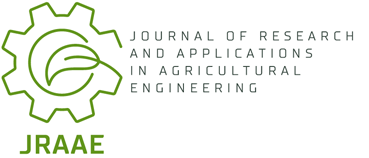Current issue
Online First
Archive
Instructions for Authors
Guide for Authors
Peer Review Policy
Research Ethics Policy
Ghostwriting and Guest Authorship
Copyright
Open Access Policy
Plagiarism
About the Journal
Aim and Scope
Scientific Board
Publisher
Editorial Board
Indexing in Databases
Personal Data Protection
Repository Policy
Contact
ORIGINAL PAPER
Evaluation of the economic and environmental effects of conversion from conventional into organic farming system
Journal of Research and Applications in Agricultural Engineering 2008;53(3):112-117
KEYWORDS
ABSTRACT
In the paper the economic and environmental effects of conversion from conventional into organic farming system was analyzed. The research was conducted in 2004-2008 at the Experimental Station of IUNG-PIB in Grabów. Cropping pattern, crop yielding and productivity of the whole crop rotations were evaluated in the economic part of the research. Whereas in the environmental part of research soil fertility in P and K, soil pH, nutrient and organic matter balance and concentration of Nmin in a soil profile were analyzed. Conversion of a farm from conventional into organic farming system decreased plant productivity by around 24%. In a consequence of transforming the forage base and at the same milking cows density a slightly greater milk production was achieved. Analysis of soil nutrient fertility revealed on some fields a tendency to drop a potassium and phosphorus content in soil, and therefore there will be a need for application of appropriate fertilizers. Monitoring of Nmin content in soil and organic carbon indicated a lack of environmental risks and a positive balance of organic matter.
REFERENCES (11)
1.
Asdal A., Bakken A. K.: Nutrient balances and yields during conversion to organic farming in two crop rotation systems. Designing and testing crop rotations for organic farming. Danish Research Center for Organic Farning. 125-132, 1999.
2.
Duer I., Fotyma M. (red.): Polski Kodeks Dobrej Praktyki Rolniczej. Wyd. IUNG, Puławy 2001.
3.
Dreymann S.: N-Haushalt unterschiedlich bewirtschafter Rotklee-Bestande und deren Bedeutung fur die Folgefrucht Weizen im Okologischen Landbau. Schriftenreihe des Inst. fur Pflanzenbau und Pflanzenzuchtung der Christian-Albrechts-Universitat zu Kiel; Heft 41,2005.
4.
Fotyma M., Jadczyszyn T., Pietruch Cz.: System wspierania decyzji w zakresie zrównoważonej gospodarki składnikami mineralnymi - MACROBIL. Pam. Puł.124: 81-89, 2001.
5.
Jończyk K.: Ocena wykorzystania i strat azotu w ekologicznym i konwencjonalnym systemie produkcji roślinnej. Wybrane zagadnienia ekologiczne we współczesnym rolnictwie. Monografia, tom 2, PIMR, Poznań 2005,s. 77-83.
6.
Jończyk K., Kuś J., Stalenga J.: Produkcyjne i środowiskowe skutki różnych systemów gospodarowania. Problemy Inżynierii Rolniczej. 1, 2007, s. 13-22.
7.
Jung R., Schmidtke K., Rauber R.: N2 - Fixierleistung und N - Flachenbilanzsaldo beim Anbau von Luzerne, Rotklee und Persischen Klee. Beitrage zur 8. Wissenschaftstagung Ökologischer Landbau, Kassel, 1-4 Marz 2005, s. 261-264, 2005.
8.
Köpke U.: Nutrient Management in Organic Farming Systems: the Case of Nitrogen. Intern. Workshop on Nitrate Leaching, 11-15.10.1993, Copenhagen, Denmark. In Biological Agriculture and Horticulture (BAH), Vol. 11/1995, s.15-29, 1995.
9.
Kuś J. Systemy gospodarowania w rolnictwie. Rolnictwo ekologiczne. Mat szkol. 45/95, Puławy, 1996.
10.
Kuś J., 2005. Plonowanie roślin w systemie ekologicznym, integrowanym i konwencjonalnym. W: Wybrane zagadnienia ekologiczne we współczesnym rolnictwie. Monografia t. 2, Wyd. PIMR Poznań, 37-46.
11.
Kuś J., Jończyk K.: Ocena organizacyjna gospodarstw ekologicznych w Polsce. Journal of Research and Applications in Agricultural Engineering, Poznań, 2007, Vol.52 (3), 95-100.
Share
RELATED ARTICLE
We process personal data collected when visiting the website. The function of obtaining information about users and their behavior is carried out by voluntarily entered information in forms and saving cookies in end devices. Data, including cookies, are used to provide services, improve the user experience and to analyze the traffic in accordance with the Privacy policy. Data are also collected and processed by Google Analytics tool (more).
You can change cookies settings in your browser. Restricted use of cookies in the browser configuration may affect some functionalities of the website.
You can change cookies settings in your browser. Restricted use of cookies in the browser configuration may affect some functionalities of the website.


